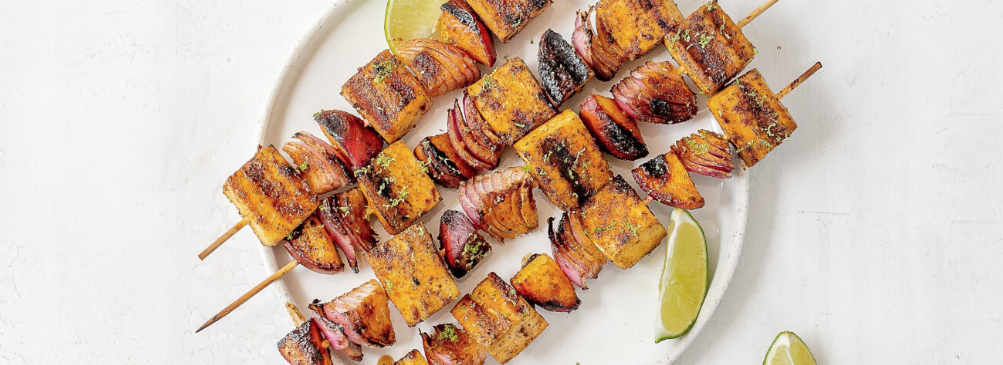Are you on Threads?
I’ve been going back and forth. Having never really been a Twitter X person, it’s interesting to have a different space to connect with people, see what’s going on in the wellness space (cause I’m real bad and keeping up with trends) and see different perspectives.
You can hang out with me here (slightly unhinged – is that word overused now?)
I’m somehow in the menopause, fitness and NFL threads scene (*somehow aka the algorithm is filling that in for me and it’s kinda fun*) and seeing a LOT of “hot takes” that are … not helpful. I had no idea people are out there daily asking the internet full of lay-people for medical advice that should definitely be something you talk to your doctor about. Among other things.
Like protein.
Y’all — the protein obsession is real and it’s big.
On my nicely curated Instagram – call it an echo-chamber if you will – I really don’t scroll much, never use the “explore page” and don’t see things that I’m not myself posting or talking about with followers. This is for my sanity and mental wellness I cannot see everything out there it makes me crazy. But Threads is different and I see A LOT and there is A LOT out there about protein.
So let’s talk about it.

What’s the deal with protein?
Protein is a macronutrient (like carbohydrates and fat – all essential to survival).
Proteins play a necessary role in the structure, function, and regulation of your body (as do fats and carbohydrates). They are composed of amino acids, which, as we all memorized in 4th grade, are the building blocks of life. There are 20 different amino acids, and the specific sequence and arrangement of these amino acids determine the structure and function of each protein.
*spoiler: you can get all 20 amino acids from plants and you do not need to pair protein sources to achieve optimal amino acid status*
What protein does in the body:
- Structure: Proteins serve as the structural foundation for tissues and organs. Collagen, for example, is a protein that provides strength and support to skin, tendons, and bones. Your body makes it though, no need to run out and buy a ton of expensive collagen. Just get enough protein overall and you’re good.
- Enzymes: Many proteins act as enzymes, facilitating chemical reactions in the body. Enzymes speed up these reactions, making them essential for processes like digestion and energy production.
- Transport: Proteins like hemoglobin transport oxygen in the blood, while carrier proteins transport molecules across cell membranes.
- Immune Function: Antibodies are proteins that help the immune system identify and neutralize pathogens. (note: you are not “boosting your immune system” with protein, or any food/nutrient/supplement – you’re “supporting” it)
- Hormones: Some proteins, such as insulin and growth hormone, act as messengers in the body’s regulatory processes.
Daily Intake Recommendations:
The recommended daily intake of protein varies depending on factors like age, sex, activity level, and overall health. The standard recommendation is 0.8-1.2g/kilogram body weight in protein.
Let’s repeat that – grams per KILOGRAM body weight.
Unlike the wellness girlies trying to sell you on 100g daily or 1g/pound body weight — this measure is a precise equation based on KILOGRAMS.
I’m totally not yelling but please don’t base your protein intake on your weight in pounds. Cool? Cool.

If you’re super active and building a ton of muscle (power lifting comes to mind – not regular gym-going), pregnant, breastfeeding then your needs increase. Anything over 1.6g/kg body weight is unnecessary and there’s no evidence to support that much protein AND you need to make sure you’re balancing all that protein with adequate carbohydrates and fat sources. The majority of your calories from food should not be protein (yes there are exceptions, no you probably don’t fall into those categories).
Sources of Protein:
Protein can be obtained from both animal and plant-based sources. Again, no need to worry about getting all your amino acids in specific combinations – that’s a myth. If you’re plant based, you may need to slightly increase your protein intake to account for bioavailability but again, it’s *slight* and more doesn’t always equal better.
Animal Sources:
- Lean meats (chicken, turkey, lean beef)
- Fish (salmon, tuna, trout)
- Eggs
- Dairy products (milk, yogurt, cheese)
Plant-Based Sources:
- Legumes (lentils, chickpeas, black beans)
- Tofu and tempeh
- Nuts (almonds, peanuts, walnuts)
- Seeds (chia seeds, flaxseeds, pumpkin seeds)
- Quinoa
- Soy products (edamame, soy milk)
- Whole grains (brown rice, oats)
- Green leafy vegetables (spinach, kale)
- Seitan (wheat gluten)
- Spirulina and nutritional yeast (for supplemental protein)
Implications of Too Much Protein:
Consuming excessive protein can have various consequences, including:
- Kidney Strain: High protein intake may put extra stress on the kidneys, potentially leading to kidney damage in individuals with preexisting kidney conditions. This is in extremely high amounts though (like 100lb girlies who don’t lift eating over 100g protein daily …)
- Bone Health: A diet too high in protein, especially from animal sources, can lead to calcium loss, potentially affecting bone health.
- Dehydration: Protein metabolism can increase the body’s water requirements, potentially leading to dehydration if fluid intake is insufficient.
- Digestive Issues: Excessive protein consumption may cause digestive discomfort, such as constipation or diarrhea.
Implications of Too Little Protein:
Inadequate protein intake can have negative effects on health, including:
- Muscle Loss: Protein is essential for muscle maintenance and growth. A deficiency can lead to muscle wasting and weakness.
- Slow Wound Healing: Protein is crucial for tissue repair, so a lack of protein can slow down the healing process.
- Impaired Immune Function: Insufficient protein intake can weaken the immune system, making the body more susceptible to infections.
- Hair and Skin Issues: Protein deficiency may lead to brittle hair, hair loss, and skin problems.
- Hormonal Imbalances: Protein is necessary for the production of hormones, so a lack of protein can disrupt hormonal balance.
Let’s backup a sec and look at those daily recommendations again:
about 0.8-1.2g/kg body weight
If we round to 1.0g/kg body weight then you take your weight in lbs, divide by 2.2 and that’s your protein for the day. So, if you weigh 150lbs then you need about 68g of protein daily.
That can look like:
Breakfast: Greek Yogurt Parfait
- 1 cup of Greek yogurt (around 20 grams of protein).
- Add a handful of mixed berries (around 2-3 grams of protein).
- Sprinkle with 1 tablespoon of chia seeds (around 3 grams of protein).
Total protein for breakfast: Approximately 25-26 grams.
Mid-Morning Snack: String Cheese and an Apple
- 1 string cheese (around 6-7 grams of protein).
- 1 medium-sized apple (around 0.5 grams of protein).
Total protein for the snack: Approximately 6.5-7.5 grams.
Lunch: Grilled Chicken Wrap
- Grilled chicken breast (4 ounces, around 25-30 grams of protein).
- Wrap it in a whole-grain tortilla.
- Add lettuce, tomato, and a tablespoon of hummus.
Total protein for lunch: Approximately 25-30 grams.
Afternoon Snack: Almonds
- A small handful of almonds (about 1 ounce, around 6 grams of protein).
Total protein for the snack: Approximately 6 grams.
Dinner: Baked Tofu Stir-Fry
- 1 cup of baked tofu (around 20 grams of protein).
- Mixed vegetables stir-fried with tofu.
- Serve over a half-cup of cooked rice (around 2-3 grams of protein).
Total protein for dinner: Approximately 22-23 grams.
Total for the day: about 85g of protein (above the 68g needed for a 150lb person)
^^ also notice how this sample meal plan also includes a nice balance of carbohydrates and fat to round out all the macronutrients while also including a lot of plant diversity and variety to ensure enough fiber and hitting on all the vitamins and minerals you need in your diet as well.
When we obsess about protein, we often forget that we’re eating FOOD, not nutrients. And one nutrient isn’t better than any other. They’re ALL ESSENTIAL and it’s a delicate balance that you can achieve when you stop obsessing about individual nutrients and ingredients and start nourishing with intention and balance and giving yourself freedom to feast.
If you stuck around for all that, thank you and congrats! You’re better equipped to reach a balanced nutrient dense diet than most wellness influencers!
xo – bri





Read the Comments +